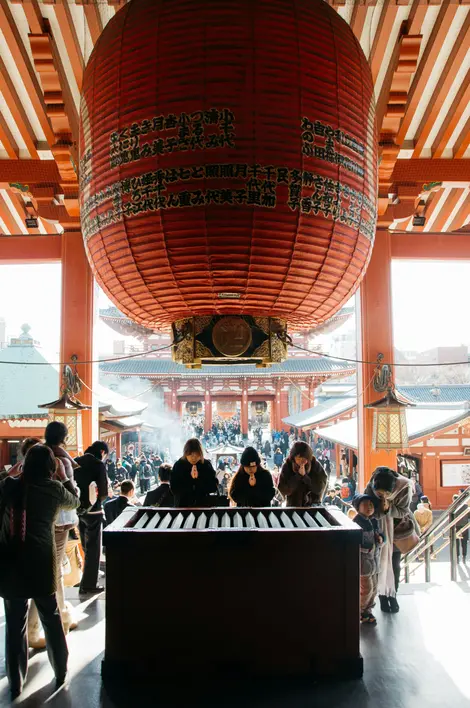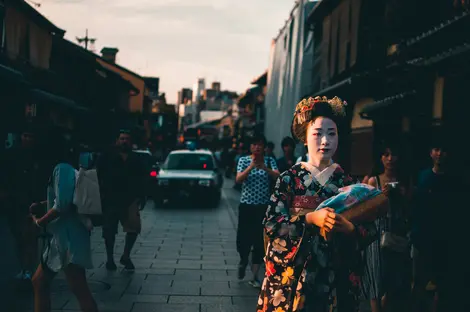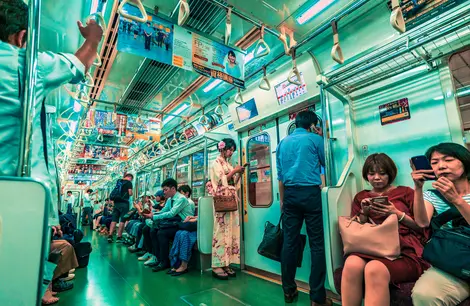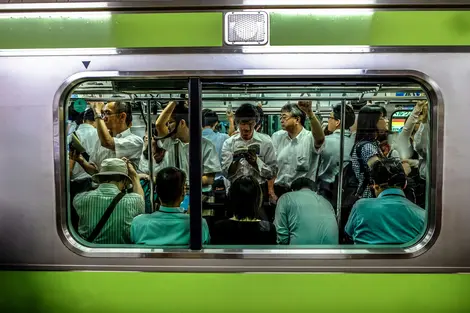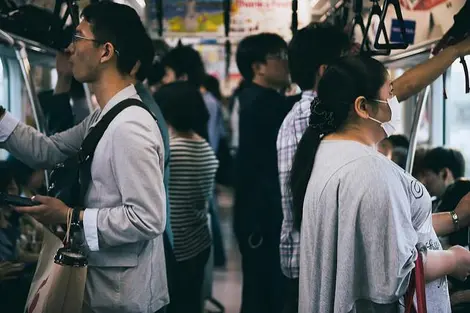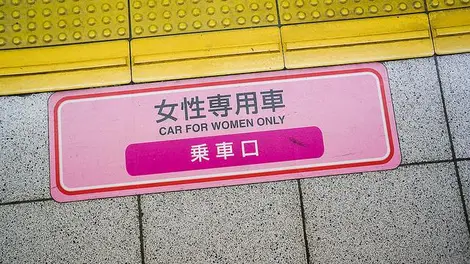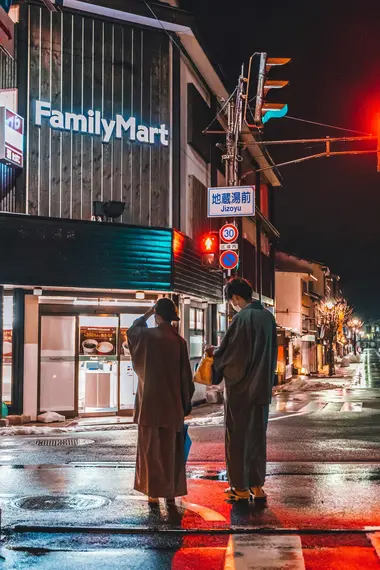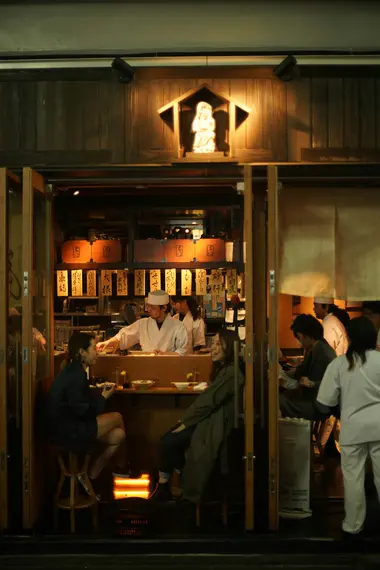Travelling in Japan: Etiquette Tips and Customs for a Successful Stay
Adopt the codes: A practical and cultural guide
Visiting Japan means immersing yourself in a rich new culture. For a complete and respectful immersion, and to ensure quality interactions with the locals, it's important to familiarize yourself with the country's customs and social codes: here are a few tips to follow to be a good traveler in Japan.
1. Politeness
In Japan, much like any other country, respect and politeness are fundamental values. Adopt a respectful attitude in all circumstances. Smile, greet people with a slight nod, say hello “konichiwa” and use polite expressions such as “arigatou gozaimasu” (thank you very much) and “sumimasen” (excuse me). These simple gestures can greatly improve your daily interactions.
For example, in shops, a hello, a smile and a sincere “arigatou gozaimasu” will let salespeople know that you appreciate their service, reinforcing warm, positive exchanges.
2. Modesty
In public transport, for example, telephone conversations are virtually non-existent. Indeed, it's recommended to put your phone on silent mode, and in some cases, such as on trains, announcements remind you of this rule.
However, talking is perfectly acceptable, preferably in a low voice. As in all public places, listening to music or video over the loudspeaker is also frowned upon.
Interestingly, behavior can change at night. Although the Japanese generally speak in low voices on public transport, it's not uncommon to hear them raise their voices when traveling late at night.
In temples and other sacred places, discreet conduct is particularly appreciated to preserve the serenity of the place. In principle, photography is always permitted outdoors, but don't take photos of Japanese people, especially when they are praying. In most temples, however, it is forbidden to take photos inside the Kondo, the building housing the venerated statue. To avoid any confusion, there is always a clear indication in places where photography is forbidden (a crossed-out camera).
This is also the case in traditional, residential areas. In Kyoto, for example, particularly in the Gion district, it's tempting to try to get in front of a maiko (apprentice geisha), or a geisha, to take the best photo of their kimono, but it's forbidden to take photos of them, even discreetly, on pain of a fine.
3. Shared spaces
Public spaces like trains, parks and streets are often shared by many people. Make sure you leave these places as clean as you found them. In Japan, garbage cans on the streets are relatively rare; you'll find them mainly in restaurants, convenience stores (like 7-Eleven or Family Mart) or you'll have to wait until you get home to throw your garbage away. You'll quickly notice that the Japanese have a great respect for the cleanliness of public spaces.
In parks and streets, for example, it's rare to see litter on the ground.
In Japan, you can't smoke in public spaces, but you'll find “smoking” areas around large ashtrays in the streets. As for restaurants, bars and cafés, you'll need to find out in advance whether a smoking area is available. Please note that you may be fined for any infringement.
4. Public transport
Public transport in Japan, such as trains and buses, is renowned for its punctuality, cleanliness and efficiency. Behavioral rules are rigorously followed by the local population.
- When waiting for public transport, good manners dictate queuing alongside the train to facilitate entry and exit. To help users adopt this behavior, ground markings are often present in stations. These markings indicate where to stand to leave a clear space in front of the doors.
- Make way for the elderly, pregnant women and the disabled. To facilitate this, there are specific markings for People with Reduced Mobility (PRM), indicating spaces reserved for wheelchairs and people with special needs, as well as priority seating.
- Some public transport systems have women-only carriages, often marked with floor markings and signs. These cars have been set up to ensure the safety and comfort of female passengers, especially during rush hours and at night.
- It is recommended that backpacks be removed and held in front of you to avoid disturbing other passengers during peak periods. The same applies to suitcases.
- Eating and drinking on local trains and buses is generally frowned upon, although it may be accepted on long-distance trains such as Shinkansen (high-speed trains) - and even encouraged, experience an ekiben on board the Shinkansen.
- Telephone conversations are strongly discouraged on trains and buses. You're asked to put your phone on mute and keep your voice low.
By adopting this attitude, you'll blend naturally into the landscape and show that you respect local norms.
5. Privacy
When taking photos, focus on landscapes and avoid photographing people without their permission. So if you want to take a photo of someone, be sure to ask permission.
In Japan, the notion of “Honne” and “Tatemae” are aspects of social interaction that may not be inherently understood by some visitors.
“Honne” refers to a person's true thought or intention, often hidden or not openly expressed. It's what someone really feels or thinks.
In contrast, “Tatemae” refers to publicly displayed attitude or behavior, which may differ from what the person feels internally.
This involves following cultural norms and societal expectations. This distinction is important for understanding social interaction and communication in Japan, where subtlety and respect for social conventions play a central role.
Similarly, avoid making intrusive comments or questions about the personal lives of the people you meet. Discretion in interactions and respect for personal space are important aspects of Japanese culture. By respecting these norms, you will show that you are attentive and respectful of local sensitivities, which will make your interactions more harmonious and pleasant.
6. Onsens
When visiting an onsen, it's important to observe certain manners to ensure a pleasant experience for all.
- Before entering the baths, be sure to wash and rinse yourself in the shower area. It's important to be completely clean before plunging into the communal baths.
- Tattoos may be frowned upon in some onsen, so find out in advance about the establishment's policy. In some establishments, a special patch is provided to hide tattoos.
- Once in the bath, avoid making too much noise or swimming.
- It's also forbidden to bring towels or personal items into the water. In sento baths, it is sometimes possible to rent towels on site. In hotel onsen, however, towels are always provided.
- What's more, it's forbidden to enter in a bathing suit.
- Respect other people's space and enjoy the calm environment of the onsen.
An onsen offers much more than a simple bathing experience: it's a sanctuary of relaxation where respect for the rules and tranquility are paramount for everyone.
7. Eating habits
- Meals in Japan are often accompanied by a few traditional cultural practices:
- It's courteous to say “itadakimasu” (thank you for the meal) before starting to eat
- and “gochisousama deshita” (it was a feast) as you leave the restaurant.
These expressions show your gratitude to those who prepared the meal.
- It's courteous to say “itadakimasu” (thank you for the meal) before starting to eat
- It goes without saying to wash your hands before meals:
- The oshibori (wet towels), usually given, will be of great help. They are also used to clean one's own table before leaving, a gesture that attracts the sympathy of the Japanese as it is so uncommon among tourists
- The oshibori (wet towels), usually given, will be of great help. They are also used to clean one's own table before leaving, a gesture that attracts the sympathy of the Japanese as it is so uncommon among tourists
- Try to sample every dish you are served, even if it's only a small bite. This demonstrates your open-mindedness and respect for the local cuisine.
- It's perfectly acceptable to make noise while eating ramen, for example, as noodles are often served hot and expected to be eaten before cooling down.
- Certain gestures, however, are frowned upon and show disrespect for local customs:
- Sticking chopsticks vertically into the rice
- Pointing at someone with chopsticks
- Passing food to each other from set of chopsticks to chopsticks
- Rubbing wooden chopsticks together after separating them
- Pulling and pushing bowls and plates to and from oneself using chopsticks
8. Punctuality
Punctuality is relatively very important in Japan. Whether it's for an appointment, a restaurant reservation or a guided tour, make sure you arrive on time, or even a little early. This shows your respect for other people's time and reflects a responsible and respectful attitude. Punctuality is seen as a mark of seriousness and consideration.
For example, on public transport, timetables are strictly respected, and arriving on time for an appointment is a mark of respect for the person you are meeting.
9. A few words in Japanese
While translation tools can erase the language barrier, making the effort to learn a few Japanese words can make a big difference.
Use simple phrases like :
"Konnichiwa": Hello,
"Onegai shimasu": Please,
“Arigatou gozaimasu”: Thank you very much
“Sumimasen”: Sorry
It shows your respect and your desire to fit in. The locals will greatly appreciate your effort. By learning common phrases, you show that you respect their language and culture, which facilitates interaction and enriches your travel experience.
10. Additional advice for courtesy in Japan
- Sitting on the ground in most public spaces, such as inside transportation, at stations, or inside stores, is largely taboo in Japan. Depending on the situation, such as on the street at festivals or some nightlife areas like in Shibuya or Shinjuku, it may be more common, but it's important to be mindful of the surroundings you find yourself in.
- Tipping culture is not standard in Japan, and attempting to do so may cause more trouble than its worth for everyone involved. There are restaurants or cafes that may have tipping jars, but even these are relatively rare. Unless very apparently an option, it's best to assume that a tip is not expected in most situations.
- While many people in Japan will have English abilities to more than accommodate for your time in Japan, it is not one of the country's official languages, so speaking clearly and slowly will help to smooth out communication.
- Changing the content of orders or specific ingredients isn't as standard of a practice in Japan as compared to the west. Though restaurants will often accommodate for allergies or remove things from certain orders out of preference (i.e. no tomato or lettuce, etc.), swapping certain ingredients or heavily customized requests may be turned down.
- A majority of taxi services in Japan utilize automatic doors that both open and close at the driver's discretion. It's common practice to let the taxi driver's open car doors using this feature, rather than customers operating the door handle themselves.
- There are a number of rules at Shinto Shrines that aren't even well-known among Japanese natives, but some easy to follow courtesies is to avoid walking down the center of the main path at a shrine and to bow before going through and leaving through a torii gate.
- When going up and down escalators, there is often one side designated for standing and one side for walking up. In Tokyo and a majority of the country, it is common practice to stand on the left side and walk on the right side. In Kansai, it is the opposite. This is an important rule to follow as standing on the wrong side can be troublesome to those wishing to walk.
By following these tips, you'll help create positive nteractions with locals, while enriching your own travel experience. Japan is a welcoming and fascinating country, and you'll appreciate its cultural and human wonders even more.




